PEN Journeys: Memoir of Literature on the Line
Publication Day—a combination of birthday, final exam, perhaps wedding day—the day when a book officially launches into the world, though in this pandemic time, the whistles and confetti and celebrations are at least postponed till spring and outside gatherings, but the book itself is on its way to whatever shores and audience will take it in.
PEN Journeys: Memoir of Literature on the Line officially enters the world February 1, 2022, though it has been available digitally on Kindle and AppleBooks for the past month, and at least one bookseller has been shipping as soon as orders were received because the publisher, Shearsman Books, had the books ready early.
I invite readers to enjoy and to share the stories of the remarkable worldwide gathering of writers who are often those on the line with their imaginations and facts and literature in problematic regions of the globe, writers who often have helped shape their societies, writers who have also had to pay the consequences.
I copy below a summary of the book and announce a signed book giveaway to the first dozen readers who request a book either in the comments section of this post or by replying in the Contact section of this website https://joanneleedom-ackerman.com/contact/ or on Goodreads. I hope readers will also buy the book, and if you enjoy it, I hope you’ll tell a friend, give a shout, write a review, dance a jig. Word of mouth remains the engine writers depend on.
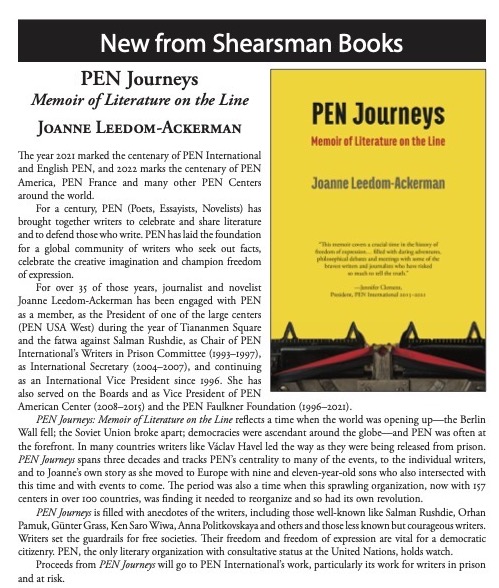
Finally, as I have done during this past year of lockdown, I’m taking this space to aggregate blog posts for the month over the last 13 years. January posts ranged from the U.S. to Haiti to Pakistan to Turkey, Lebanon, Australia, Denmark and Spain, often with a view to the year past and the year ahead.
January 29, 2009: When the Crowds Go Home, Ideas Keep Traveling
The crowds have left; the reviewing stands, disassembled. The reflecting pool is frozen with sea gulls light-footing across it. Washington, DC has held its grand party. For three days, everyone was on foot, bundled in coats, scarves, gloves and walking everywhere–to the Mall, to the Capitol, to the White House (or as close as one could get), peering over barricades, hundreds of thousands of people.
Most of those who came to town have returned to all the states in the union from which they came. Those from the more than 100 foreign countries here to watch the Inauguration have also returned. As the full working week commenced in Washington, snowflakes were falling; the sky was cloudy, and the Potomac River, crusted with ice at the edges, waited for spring.
But the spirit remained. And the consequences of this global gathering were only beginning. Among those visiting Washington were women from the world’s conflict regions, women engaged in peace building, who were gathered to share experiences and also to study and watch the U.S. electoral process, particularly as it might apply to their circumstances and lives.
At a conference, sponsored by the Initiative for Inclusive Security, women from Afghanistan, Bolivia, Israel, Kashmir, Lebanon, Liberia, Palestine, the Philippines, Sri Lanka, Sudan, Uganda and other areas came together for training, exchanging experiences, and working on peace initiatives around the globe. After the main conference, a dozen women met in a side room around a table with tea and coffee and strawberries, women from Uganda, Sudan, Sri Lanka, Iran and the U.S. to consider how to get more women in the electoral process in these countries….[cont]
January 18, 2010: Haitian Farewell
I met Haitian writer Georges Anglade, a bear of a man with a curly gray beard, in the Arctic Circle, in Tromso, Norway in 2004. He spilled a glass of red wine on me. We were at the opening reception of International PEN’s Congress, and whether we were moving in the same or opposite directions around the hors d’oeuvres table or he was gesturing with enthusiasm with his wine glass in his hand, I no longer remember; but the flow of wine down my black suit we both remembered every time we saw each other in the years that followed. It bound us in a moment of surprise and laughter and a kind of instant friendship as if I had been christened by him.
It was easy to be friends with Georges. He was warm, thoughtful and passionate about literature and language and about Haiti. He had come to the PEN Congress in Tromso to petition International PEN to establish a Haitian Center, which it did in 2008. Georges was the founding President.
Born in Haiti, Georges lived in Montreal, where for years he was a professor of social geography at the University of Quebec. He was also a vigorous defender of freedom of expression for writers, especially in Haiti, where he had been a political prisoner under the Duvalier regime. He visited Haiti as often as possible and was in Port-au-Prince when the massive earthquake struck on January 12. He was at a friend’s house, along with his wife of 43 years, Mireille Neptune. Neither Georges nor Mirelle survived. It is with deep sadness that I, along with colleagues around the world, bid Georges Anglade farewell.
Georges has been described by many friends as “a force of nature,” perhaps because of his grand size, his hearty laugh and his embrace of life. The force of nature which confronted him cannot really extinguish him. In his book Haitian Laughter, Georges wrote, “A people of laughter, they often say, justifiably astonished to see Haitians laugh in spite of their three hundred years of desperate situations; but do they know that it is precisely those three hundred years’ -wars that made them a people of lodyanseurs* [storytellers]….?”
Georges himself told these stories. The force of his life remains in his writing, in memory, and in the stories.
In an odd coincidence, the day of the earthquake, I was re-reading (as I do every decade or so) Graham Greene’s masterpiece, The Comedians, set in Haiti during the dictatorship of Popa Doc Duvalier. The novel embodies the nightmare, the passion and the love of the place. Speaking of his hotel Trianon, the narrator notes:
“I had grown to love the place, and I was glad in a way that I had found no purchaser. I believe that if I could own it for a few more years I would feel I had a home. Time was needed for a home as time was needed to turn a mistress into a wife. Even the violent death of my partner had not seriously disturbed my possessive love. I would have remarked with Frère Laurent, in the French version of Romeo and Juliet, a sentence that I had reason to remember:
Le remède au chaos
N’est pas dans ce chaos.
The remedy had been in the success…”
The world is now mobilizing to bring aid to Haiti. One can only hope that the attention and outpouring can restore and revitalize not only Haiti but the world that is for this moment at least coming together to assist.
[*lodyans are “brief, humorous stories, designates short, amusing tales at which Haitians are past masters and which are told at particular occasions (parties, evening gatherings, after a good meal…). The person who tells these lodyans is known by title of lodyanseur…”]
January 29, 2011: Ice Flows: Freedom of Expression
The Potomac River in Washington is frozen, though only with a light crust of ice, not like the Charles River in Boston which appears a solid block that one might stomp across all the way to Cambridge, though in the center a soft spot could crack open at any moment. Measuring the solidity of surfaces can be a matter of life and death.
The image of frozen surfaces arose as I was reviewing for a talk the appeals sent on behalf of writers in prison or killed for their work in the past year. Around 90 Rapid Action alerts (RANs) were sent out by PEN International, which tracks the situation of writers worldwide. I’d sent appeals on approximately half of these. I reviewed the risk and judgment of the writers in these countries. Some regimes were relentless; others, more arbitrary. Governments, like China and Iran, appear to be solid authoritarian regimes that brook little dissent, yet beneath the surface and at the edges, writers and others chip away, laying the groundwork for change that might yet crack open their societies.
The suppression of the writer is a barometer for political freedom in a country and can often be a predictor of events to come.
In July, the arrest of Fahem Boukaddous, a journalist sentenced to four years in prison for “harming public order” by covering demonstrations, foreshadowed both the recent suppression and the protests in Tunisia where the government’s crackdown on writers preceded the fall of the regime itself. Boukaddous and seven other writers have now been released.
In May, the arrests of Belarusian writers, including Vladimir Neklyayev, President of Belarus PEN, for “dissemination of false information” foreshadowed the sweeping arrests of writers, activists and opposition leaders during the presidential elections in December when Neklyayev and others were also candidates. It remains to be seen how the regime of Alyaksandr Lukashenko will hold, given the widespread charges of a flawed election and unrest in the population.
At the beginning of the year, the Chinese government detained and arrested writers, including Zhao Shiying, Secretary General of the Independent Chinese PEN Center. Zhao protested the arrest and sentencing of fellow writer Liu Xiaobo to 11 years for his role in drafting Charter ’08, a document that called for democratic reform in China. The year continued with the detention of Chinese writers supporting Liu and democracy and also the arrests of writers in Tibet and the Uyghur Autonomous Region. If the suppression of writers is inversely proportional to freedom and democratic change in a society, then China remains at the top of the list of frozen governments.
The year also began with writers, journalists and bloggers in prison in Iran, followed by further crackdowns on writers, including Nasrin Sotoudeh. Sotoudeh, a writer and lawyer, was sentenced to 11 years on charges that included: “cooperating with the Association of Human Rights Defenders,” “conspiracy to disturb order,” and “propaganda against the state.” Other charges brought against writers in Iran included “congregation and mutiny with intent to commit crimes against national security,” “insulting the Supreme Leader,” “insulting the President,” and “disruption of public order.” The arrests, imprisonments and executions in Iran may give the appearance of a solid block of state power, but it is a block that may yet crack from the edges and the center as citizens continue to stomp across it.
It is worth remembering the precipitous fall 20 years ago of the Soviet Union as pressure for freedom sent fissures through the system that eventually broke the harsh authoritarian surface. As the world watches the current upheavals in the Middle East, one can track back and note the suppression of writers in Tunisia, Yemen and Egypt. The writers and their words are like a heat source that regimes try to trap beneath the surface but instead they soften up the ice.
January 30, 2012: Voices Around the World
I began this blog four years ago with modest ambition. Once a month I would pause from writing fiction or other work and weave disparate threads of the month’s events and my thoughts together and share in this new form: the blog post. The posts have often had international themes and freedom of expression themes because work and life lead me to other areas of the world and because the freedom of the individual to write, speak and think is fundamental, especially for a writer.
By posting a monthly blog I also sought to join the 21st century in digital form, but the digital century is rushing so fast that a website with a blog post seems almost obsolete. (By next month I hope to have joined, or at least touched, the social media by also posting on an “author’s page” on Facebook.) Whatever the medium, however, the message remains, and the connection of voices around the world has become transformative.
Each month notices of writers under threat come across my desk. I find myself studying the pictures of the writers when there are pictures, writing down their names, and when available, reading some of their work to make them real in my own mind and imagination and later to share their work, which governments hope to silence. Along with other members of PEN I write appeals on their behalf with no definitive measure of how effective these are, but over time the accumulation of protests from writers and others around the world does push open consciousness and prison doors.
In the past month, writers have been imprisoned with long sentences in China, Ethiopia and the Cameroons, had an expired sentence extended in Uzbekistan, been killed in Mexico, threatened with death in India, and released in Myanmar and Vietnam.
China remains the country with the most writers in long term imprisonment, including Nobel Laureate Liu Xiaobo, who’s serving an 11-year sentence. In the past month, Chen Wei and Chen Xi have been sentenced to nine and ten years for “inciting subversion of state power,” in part for essays and articles they wrote online criticizing the political system in China and praising the growth of civil society. Zhu Yufu was indicted this month on subversion for publishing a poem online last spring that urged people to gather to defend their freedoms….[cont]
January 29, 2013: Sunrise in Islamabad
As I leave Washington, DC, the sun is sinking as a gauzy pink globe just beyond the runway. I imagine it about to rise over my destination: Islamabad.
This will be my first trip to Pakistan, a country where I have friends and colleagues, but we always meet outside of Pakistan. For me the country is still a place in imagination. The picture is drawn with many strokes, beginning with media images of bustling streets in Islamabad, Lahore and Karachi, of barren rocky mountain sides in the tribal territories, images of markets and cafes and dark streets in the novels of Pakistani writers, stories of friends’ childhoods, particularly stories of women who at great odds rose to become voices and leaders in the country, and by the headlines of terrorist attacks.
When I mention where I am going even in Washington, or particularly in Washington, the first response is: “Be Careful.” That may also be the first words to Pakistanis who travel to the U.S. for the first time.
I will be attending a conference of American and Pakistani journalists, part of an exchange program for each, organized by the International Center for Journalists, a program in which over 170 journalists have had the opportunity to work in each other’s newsrooms. (See blog post Diplomacy on a Summer Evening, August, 2012.)
The misperceptions on both sides have inevitably altered as the journalists have gotten to know each other’s countries. Many of the Pakistani journalists imagined Americans would be rude and found instead they were friendly and helpful, though some were quite ignorant about Pakistan. Some Americans expected to be operating in a country of terrorists and found the citizens welcoming and struggling with many of the same issues as Americans.
My journey will allow only a quick snapshot of one city and selected citizens, but education begins and expands with snapshots. When asked if I’d ever been to Pakistan and said no, then was invited to come, I said yes. I look forward to my first sunrise in Islamabad.
January 30, 2014: Syrian Refugee Tsunami
We’d come to visit a Syrian refugee camp on the Turkish border. When we arrived in Gaziantep, a bustling ancient city just 30 miles from Syria, we were told by United Nations representatives that a battle was going on across the border that day. A bullet had struck a house in the nearby refugee camp so our visit was canceled for security reasons.
The following day a fuller story emerged. In the Syrian town of Jarabulus just 3km over the border, the battle had been especially brutal. At least 10 men were beheaded and their heads mounted on spikes to terrorize the community. The Syrians from the town were now fleeing to Turkey and away from the al Qaeda-linked fighters.
This particularly grisly battle underscores the horror and tragedy facing the almost nine million Syrians (6.5 million in country; at least 2.3 million outside the country) seeking security. Aid agencies estimate at least half the Syrian population of 22.4 million is in need of humanitarian assistance, and as many as three quarters of the population will be in need of aid by the end of 2014.
In the past two months I’ve visited Iraq, Jordan, Lebanon and Turkey—the four main countries absorbing this historic exodus from the three-year old Syrian civil war and have witnessed a human tsunami. Acknowledged as the worst refugee crisis in a generation, the outflow of Syrian citizens mounted a 500% increase in many areas in the past year, a figure threatening to explode further in 2014 if no progress is made in the current peace talks getting underway in Geneva. Small corridors of security for exiting women and children as recently proposed for the city of Homs will add to the momentum of the exodus.
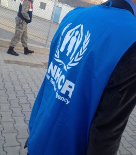 Each of the bordering countries has responded differently to the crisis. All have opened their borders, at least the first two years. The United Nations High Commission on Refugees (UNHCR) has fanned out across the region to assist according to each country’s mandate, with aid and aid workers in their sky-blue vests arranging registration, locating or establishing shelters, food, medical care and education and coordinating with other nongovernmental organizations (ngos), but few have experienced a crisis of this magnitude.
Each of the bordering countries has responded differently to the crisis. All have opened their borders, at least the first two years. The United Nations High Commission on Refugees (UNHCR) has fanned out across the region to assist according to each country’s mandate, with aid and aid workers in their sky-blue vests arranging registration, locating or establishing shelters, food, medical care and education and coordinating with other nongovernmental organizations (ngos), but few have experienced a crisis of this magnitude.
I recently returned from Turkey and Lebanon, both of whose borders are still open….[cont]
January 2015: No blog posted.
January 29, 2016: View on the Bosphorus: Rights in Retreat
I’m sitting on the Bosphorus today in Istanbul looking across to the Asian side over the balustrade of a European porch. I’ve been visiting Istanbul over the last 20 years for conferences, recently for visits to refugee camps and most often now to see family living here. Istanbul is one of my favorite cities, full of heart, multiple cultures, history and citizens of intellect and warmth.
But recently the atmosphere has chilled. I’ve come this trip to participate in the launch of Human Rights Watch’s 2016 World Report which focuses on the “Politics of Fear and the Crushing of Civil Society” as causes that imperil citizens’ rights around the world. Istanbul was chosen as the launch city because it sits at the nexus of east and west, is the crossing point for millions of refugees fleeing the Syrian war and has an active civil society and free press that are now severely tested as the environment for rights deteriorates.
“Government-led restrictions on media freedom and freedom of expression in Turkey in 2015 went hand-in-hand with efforts to discredit the political opposition and prevent scrutiny of government policies in the run-up to the two general elections,” according to Human Rights Watch (HRW) 2016 World Report.
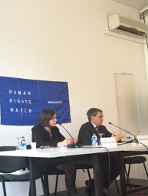
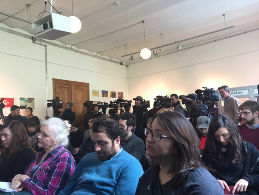
The restrictions include the investigation of Cumhuriyet newspaper for posting a report showing weapons on trucks allegedly headed to Syria. The paper’s editor Can Dϋndar and Ankara representative Erdem Gϋl were arrested and are now in jail awaiting trial. Other journalists have been arrested for criticizing the government. There have been police raids on media groups, a widespread firing of journalists perceived to be in opposition to the government, in particular to President Recep Tayyip Erdoğan. Publisher Cevheri Gϋven of Nokta news magazine and editor Murat Çapan spent two months in jail for “inciting an armed insurrection against the government” for a report and a satirical picture of Erdoğan. Nokta’s website remains blocked by a court order. Months of pretrial detention have been handed out to those allegedly insulting Erdoğan via social media and during demonstrations.
I first came to Istanbul in spring, 1997 for the “Initiative for Freedom of Expression”, a conference that brought together PEN International and freedom of expression organizations in Europe to protest the harsh treatment of writers by the Turkish government and courts. Charges had been brought against the celebrated Turkish novelist Yaşar Kemal for an article he wrote for the German magazine Der Spiegel in which he accused the Turkish army of destroying Kurdish villages. Though he was acquitted, he is quoted as saying, “One person’s acquittal does not mean freedom of expression has arrived. You can’t have spring with only one flower. We still have to work very hard to achieve democracy in Turkey. I will continue to write these things until there are no trials against expression.” Kemal passed away last spring at age 91.
At the time activist and song writer Şanar Yurdatapan organized a publication that included Kemal’s essay and the writings of other Turkish and Kurdish writers who had been banned or imprisoned. He mobilized Turkish artists and publishers and academics to sign on as the publisher, and he asked writers from the more than 100 centers of PEN International around the world also to sign on as publisher. The publication thus challenged the government which would have to bring charges against hundreds of people as publisher. And so the Gathering for Freedom of Expression was born….[cont]
January 23, 2017: Power on Loan
The first march I covered as a journalist was a massive anti-war moratorium in Boston in the spring of 1970, part of nationwide protests; Boston was one of the hub cities. The demonstrators walked peacefully from the Boston Commons through the city to Harvard Square in Cambridge. But as the day and evening wore on, the demonstration descended into violence in Cambridge with Molotov cocktails thrown through store windows and police dogs and tear gas aimed at the crowds. I took refuge eventually in the basement of a church where I wrote my story.
America was on the march back then against the Vietnam war and in earlier protests in favor of civil rights. Though there was violence, most of the demonstrations remained nonviolent.
In the intervening years there have been many marches and protests in the U.S., but few like the ones held around the country this past weekend. These nonviolent demonstrations in cities in every state and in 55 cities worldwide focused on a more loosely articulated goal, not on specific legislation or a specific action but on showing solidarity, particularly with issues important to many women like freedom of choice over their bodies and also on issues such as the rights of immigrants, of minority communities, and of the LGBT community.
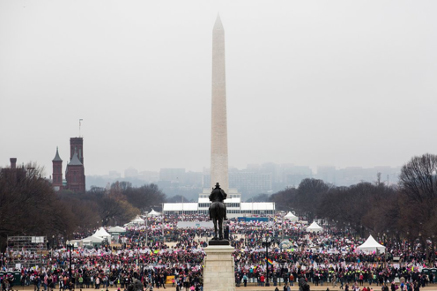
There was also apprehension about exactly what the new President’s “America First” policy will mean. Demonstrations around the world showed that America’s positions are not just the concern of U.S. citizens but have impact globally.
I’ve covered and seen many demonstrations around the globe since my first march. On Saturday, I was on the edge of the gathering in Washington, witnessing, hosting and delivering one marcher who came in from Colorado to participate. As she joined the crush in the Mall, I wrote and prepared for a PEN mission to Turkey where the political situation is deteriorating daily for citizens, especially those in the media.
In the Turkish Parliament this past week fights broke out as President Recep Erdoğan proposed and got ratified a Constitutional amendment to give even more power to the president, including an article that gives the President the right of “extorting individual rights and freedom” with statutory decree. The Constitutional amendment must be endorsed in a national referendum so demonstrations in Turkey may soon begin but with potentially direr consequences than in the U.S. In Turkey almost 150 writers and journalists are already in prison, not for crimes, but because they have dissented….[cont]
January 2018: No blog posted
January 2019: No blog posted
January 2020: [Beginning in May 2019 I started writing a retrospective of work with PEN International for its Centenary so posts were more frequent in 2019-2020. In January 2020 there were two posts in the PEN Journeys. The PEN Journeys series completed in October 2020.]
January 9, 2020: PEN Journey 16: The Universal, the Relative and the Changing PEN
PEN International celebrates its Centenary in 2021. I’ve been active in PEN for more than 30 years in various positions and now as an International Vice President Emeritus. With memories stirring and file drawers of documents and correspondence bulging, I am a bit of a walking archive and have been asked by PEN International to write down memories. I hope this personal PEN journey will be of interest.
Fremantle, Australia is far away, at least if you live in the Americas or Europe or West Africa. So is Tokyo, Manila, Nepal, Hong Kong—all destinations of PEN Congresses and conferences. As a global organization with centers in over 100 countries, PEN tries to cover the world with its meetings and at least once or twice a decade organize a Congress in Asia or Australia with its centers there.
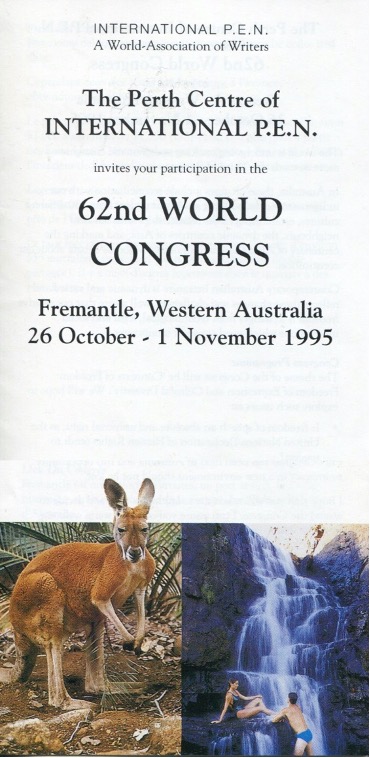 In 1995 for PEN International’s 62nd Congress Perth PEN hosted delegates from around the world in Fremantle, a port city on Australia’s western coast in the Perth metropolitan area, a picturesque city with Victorian architecture and, as I recall at the time, a town out of the 1960’s where time hadn’t quite caught up. The city’s reputation was partially derived from its history as a penal colony from the 1850’s to 1991. The traditional Aboriginal people who lived there called the area Walyalup “the crying place.”
In 1995 for PEN International’s 62nd Congress Perth PEN hosted delegates from around the world in Fremantle, a port city on Australia’s western coast in the Perth metropolitan area, a picturesque city with Victorian architecture and, as I recall at the time, a town out of the 1960’s where time hadn’t quite caught up. The city’s reputation was partially derived from its history as a penal colony from the 1850’s to 1991. The traditional Aboriginal people who lived there called the area Walyalup “the crying place.”
The 62nd Congress was one of the smaller for PEN, less formal with many delegates staying in the homes of local writers rather than in a hotel. Instead of formal receptions in houses of state, at least one evening’s entertainment was a game of literary trivia and bingo. Because the venue was on the harbor, the swimmers among the delegates, particularly Sascha (Alexander Tkachenko) General Secretary of Russian PEN, tried to swim each day despite the warnings that waters were shark-infested. Sascha defied the sharks which he considered a milder threat than what he was dealing with back home in Russia.
The Congress theme Freedom of Expression and Cultural Context translated into an endorsement of the universality of human rights as expressed in the Universal Declaration of Human Rights. Held in the 50th anniversary year of the United Nations’ founding, PEN insisted human rights were not a relative notion. “While the concept of a universal right may not have penetrated the mechanisms of all states, the invocation of the universal right to free expression remains one of the essential tools that PEN and other organizations use to apply pressure and insert a wedge into the conscience of nations,” the Writers in Prison Chair’s report noted that year.
While certain human rights were absolute, governance was relative, and PEN itself was beginning to struggle with its structure. The relaxed atmosphere of Fremantle allowed informal discussions among delegates who were urging a more democratic structure for PEN. As PEN International headed towards its 75th anniversary the following year, Boris Novak, Slovene PEN President and Chair of the Peace Committee noted that the inner structure of PEN was no longer adequate for the needs of such a large global organization. This sentiment was echoed by the American PEN delegate and delegates from Scandinavian centers. The International Secretary agreed to hold a special meeting in Perth on this question, and the discussion and the dissent began.
As chair of the Writers in Prison Committee, I shared the concerns, but the WiPC staff and I determined that the Writers in Prison Committee should remain a place where everyone came together and focused on the mission of getting writers out of prison and securing freedom of expression so we stayed on the edge of the debate. The internal politics of PEN were stirring and erupted a year later at the 1996 Congress in Guadalajara. In Perth, however, the breezes were balmy and the water warm enough to dip in if not to cross the distance between the old and the new. That process would evolve over the next several years and Congresses to come….[cont]
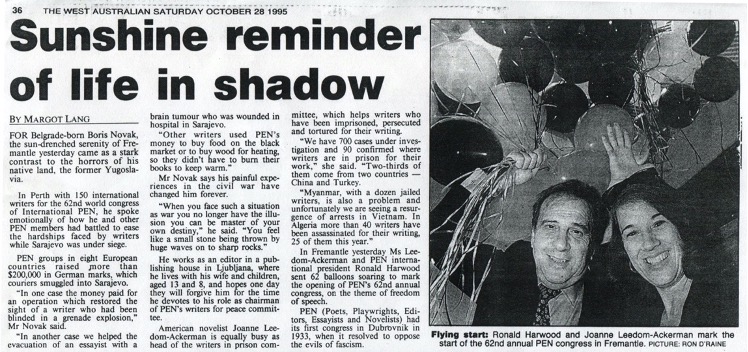
January 17, 2020: PEN Journey 17: Gathering in Helsingør
What I remember most about the gathering of colleagues from 28 countries—31 PEN centers—51 of us in all at the first Writers in Prison Committee conference in 1996 was the seriousness of purpose and intellect during the day and the fun and talent in the evenings.
Hosted by Danish PEN, writers from every continent gathered at a university in Helsingør—known in English as Elsinore, the home of Shakespeare’s Hamlet—where we met in workshops and ensemble during the day to shape and refine our work on behalf of writers and freedom of expression around the world. But in the evening we were at a small university in a small city without transportation or distraction so we entertained ourselves. Each delegate displayed talents—from poetry reading to song to dance to musical performances.
As Chair of the WiPC gathering, I’d brought none of my own writing to read and was left to exhibit meager other talent which consisted of playing a few opening bars of Für Elise on the piano and whistling tunes with my far more talented Danish and Russian colleagues. Archana Singh Karki from Nepal in flowing red dress entertained with her graceful dance; Siobhan Dowd, our Irish former WiPC director and Freedom of Expression director at American PEN, silenced us with her soulful Irish folk songs, sung acapella; Sascha, Russian PEN’s General Secretary, not only whistled robustly but recited his poetry, which I was told I should be glad I didn’t understand with its bawdy content; Sam Mbure from Kenya and Turkish/English novelist Moris Farhi also read and recited work. PEN International President Ronald Harwood joined the discussions in the day and was audience in the evening. I don’t recall if Ronnie offered his own work, but we all bonded in our mission and in our support for the talent in the room.
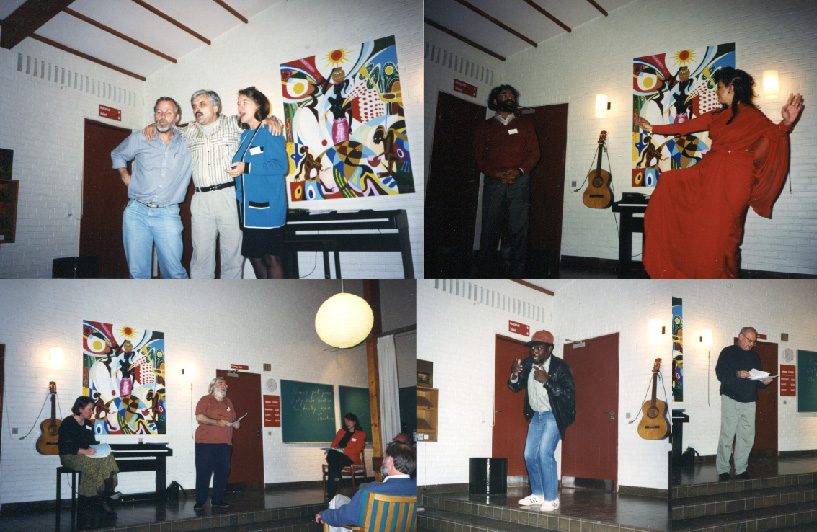
Entertainment in the evening: From the top left—Jens Lohman (Danish PEN), Alexander (Sascha) Tkachenko (Russian PEN), Joanne Leedom-Ackerman (Chair of WiPC)in a whistling song; Rajvinder Singh (German PEN, East) accompanying Archana Singh Karki (Nepal PEN) in dance; Siobhan Dowd (at piano—English & American PEN) with Moris Farhi (reading—English PEN); Sam Mbure (reciting—Kenyan PEN); Niels Barfoed (reading—Danish PEN)
During the three days, we fine-tuned our methods of working on and campaigning for our main cases, those writers who were imprisoned, attacked or threatened because of their writing, often their nonviolent voice of protest against authoritarian regimes. We considered PEN’s decision-making on borderline cases such as those which included drug charges, advocacy of violence, pornography, hate speech, terrorism. These were not categories we normally took on as cases. We discussed when we might take up such a case or assign them to investigation or judicial concern. We laid the groundwork for more joint actions among centers and other organizations such as the U.N., OSCE and IFEX, the International Freedom of Expression Exchange….[cont]

Round Table of the WiPC conference which included delegates from PEN centers in Switzerland, Jerusalem, Denmark, England, Mexico, Portugal, America, Norway, Czech Republic, Ghana, Canada, Australia (Melbourne and Sydney), Portugal, Finland, Nepal, Scotland, Malawi, Kenya, Ghana, Croatia, Slovakia, Sweden, Spain, Austria, Japan, Germany, Russia, Poland, Netherlands
January 8, 2021: In the Morning…
As many Americans, I have watched with disbelief and sadness events that have taken place in my country and in my home city of Washington, DC over the last days. I have felt unable to add words. This morning I rose early to watch the sunrise on the Eastern Shore of Maryland where I’ve been living this year.
I listened for inspiration. I wasn’t seeking political answers or recriminations, justifications or blame. I wanted inspiration to move forward. I share here the verse that came into my thought and the photos of the morning:
“The night is far spent, the day is at hand: let us therefore cast off the works of darkness, and let us put on the armour of light.” —Romans 13:12
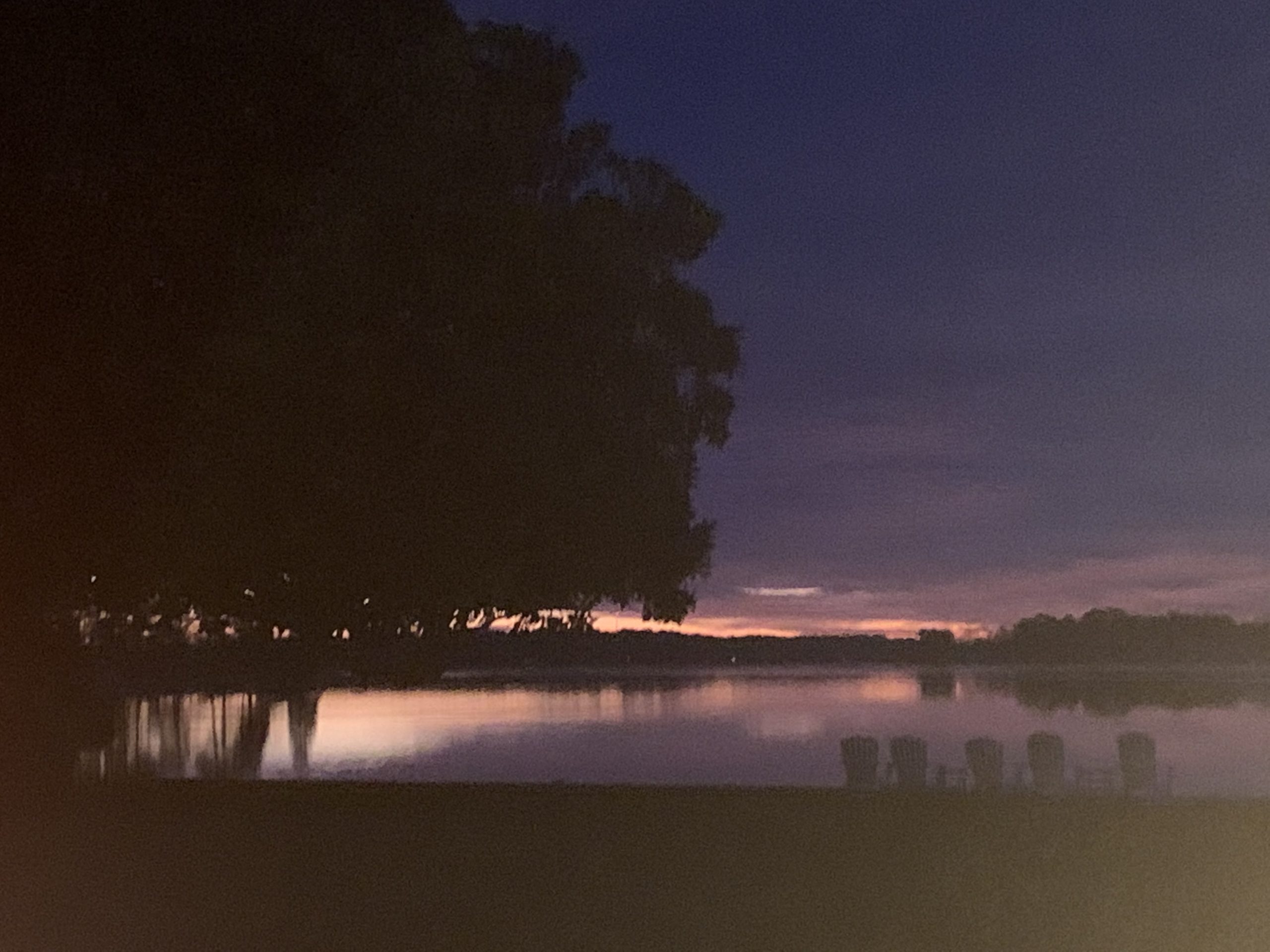
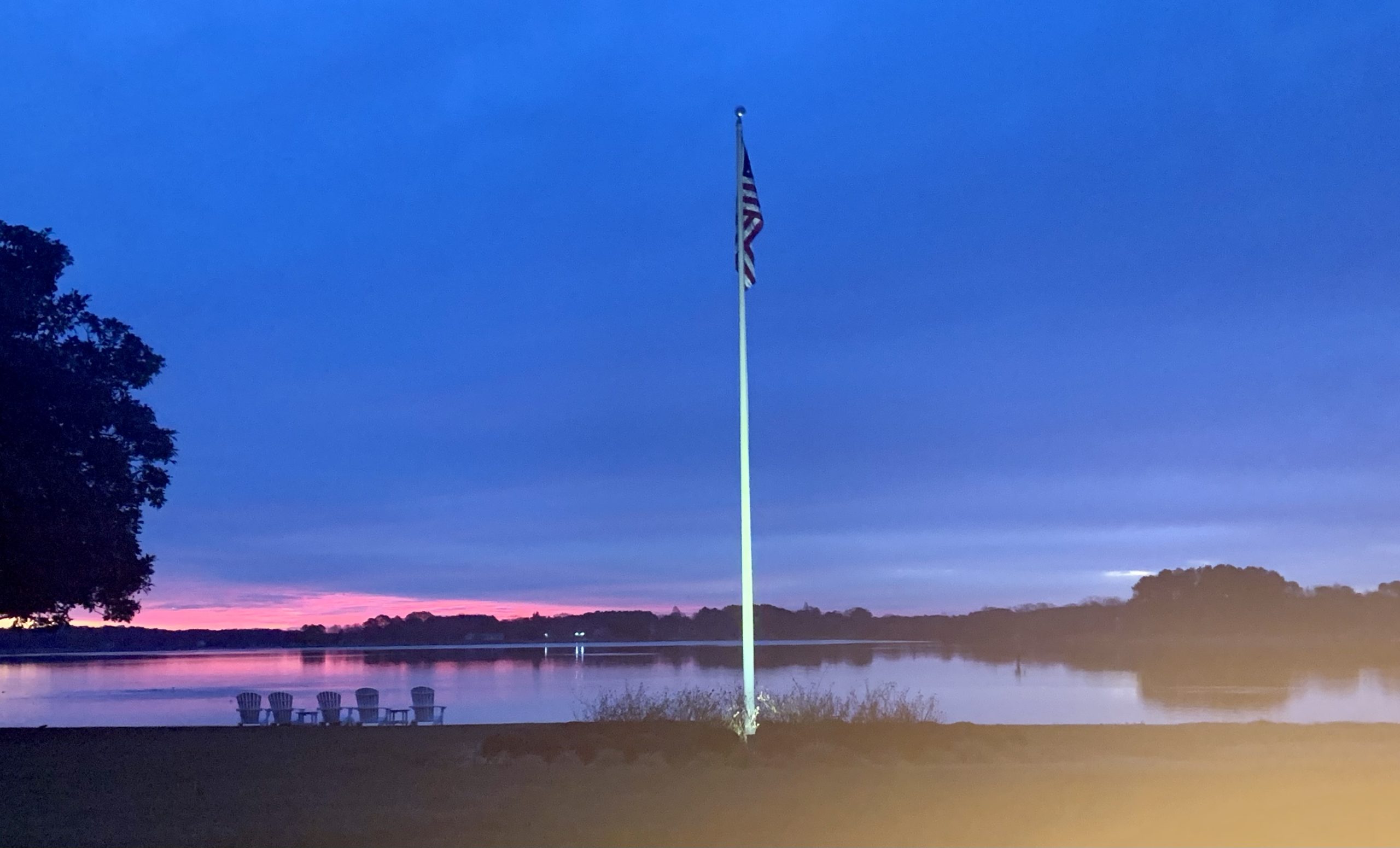
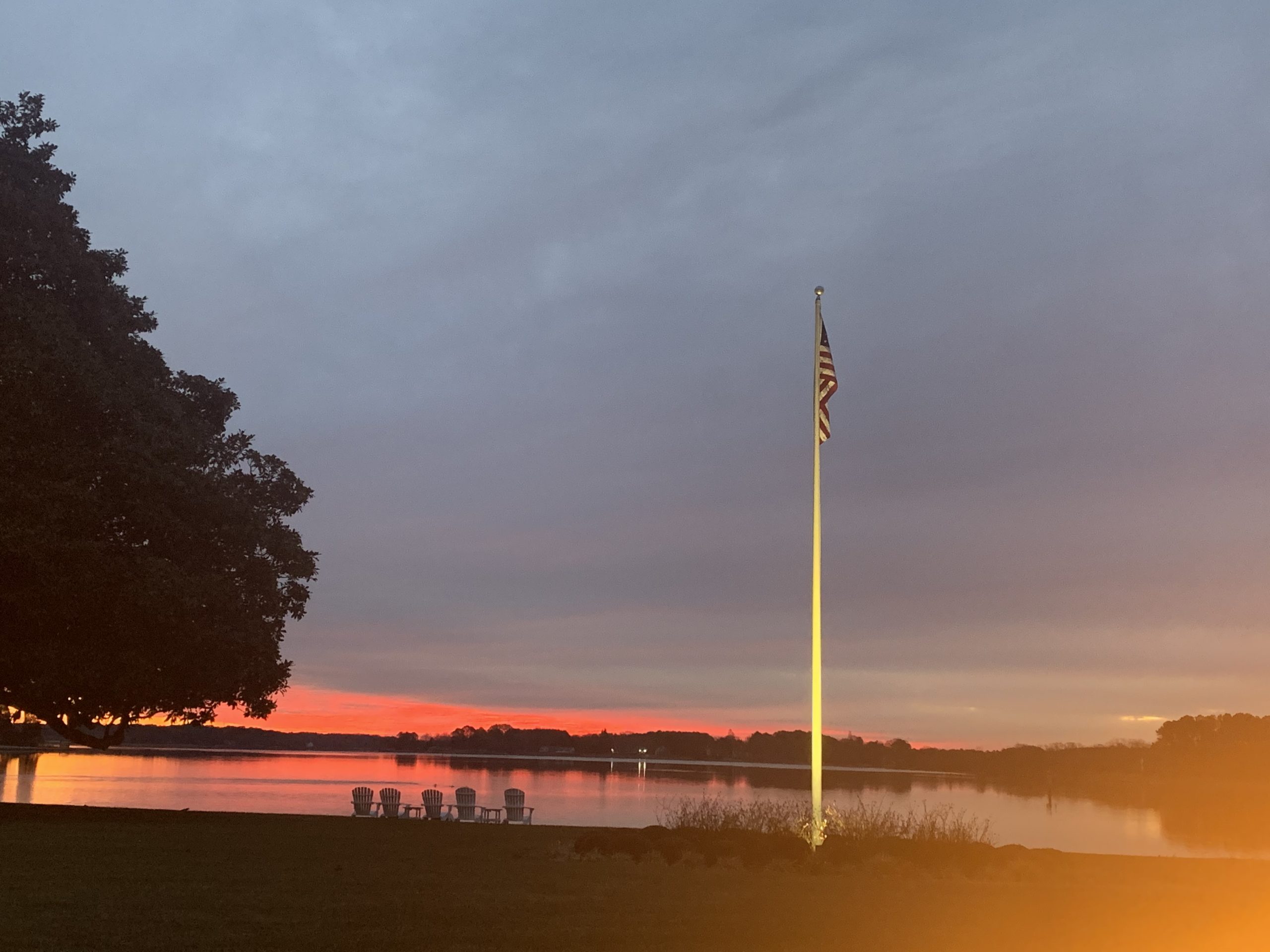
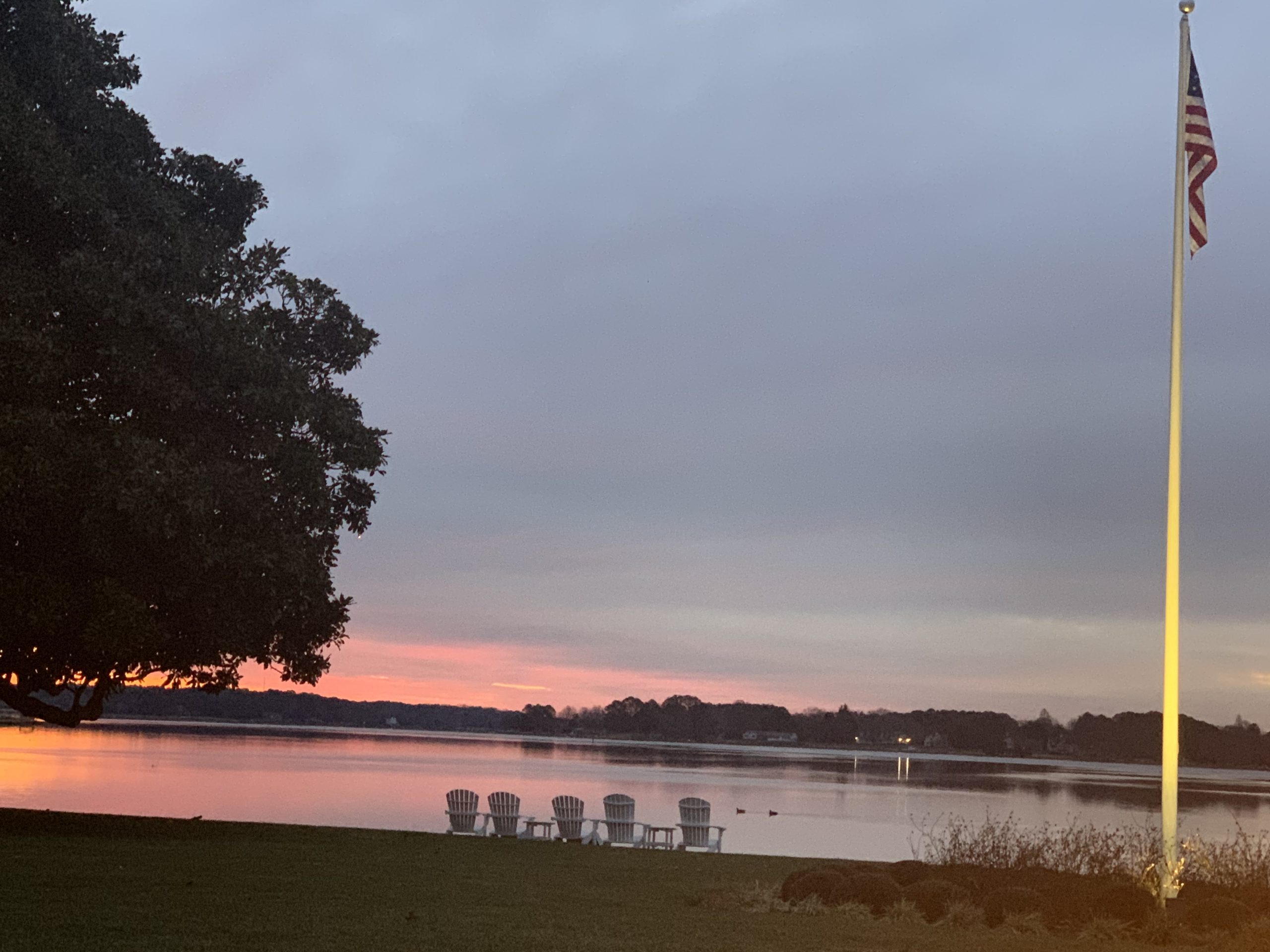
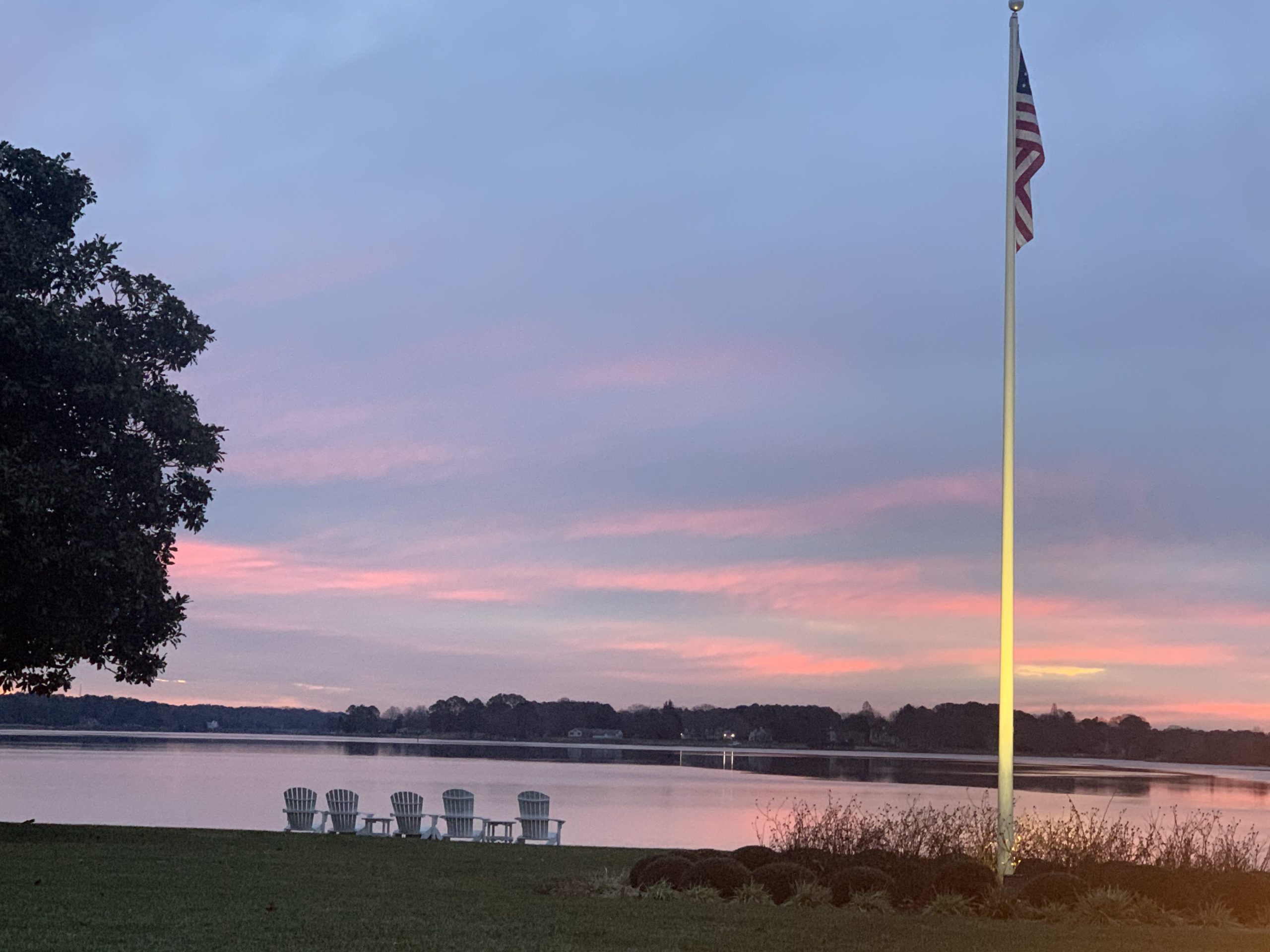
(Photo credits: Joanne Leedom-Ackerman)
I watched the sun rise this morning, the ducks swimming by south to north, the geese flying overhead north to south, the light spreading across the river—first a red strip, then orange…pink…a yellow ball peeking through the grove of trees across the water, then ascending the treetops…a golden globe heralding the day.
The river flows steadily towards an open expanse into the Chesapeake and ultimately into the Atlantic Ocean. It has been a mild winter so far, no ice on the water, just an occasional dusting of frost on the ground which melts with the sun.
On a flagpole by the river the American flag ripples in the breeze as the geese flap by. My dogs—one blonde, one black, both part Labrador and other breeds, wander along the river front, finding their smells and place to rest and watch the day unfold.
It is a new day…with a new government in my home city of Washington, DC. Today I look backward and forward at the same time. I am not the only one contemplating past and future, past as prologue? I share here two earlier posts, one from January 2009 after the inauguration of Barack Obama “When the Crowds Go Home, Ideas Keep Traveling.” Much has happened in the intervening twelve years. The other is October 2012, “A Visit to the End of the World” written from the edge of where the ancients thought the world ended, in Finisterre, Spain. Only a wide and empty Atlantic Ocean stretched before them. It was necessary to imagine…[cont]

(Photo credits: Joanne Leedom-Ackerman)
Thank you for this Joanne! Congrats on the new book
Thank you, Marita. And warm wishes for a productive and more normal gathering of friends in 2022!
Congratulations on your new book, Joanne. I already ordered a copy and look forward to its arrival. Thanks for sharing your January posts, too. If you looked up the word “intrepid” in the dictionary, your picture would be there. Even the Arctic Circle?!?! Wow!
Thank you, Cara. What strikes me as I read through the years is how fortunate I’ve been to have worked and gotten to know people around the world, what a rich gathering of people on this globe of ours!
Congratulations on your new book, Joanne! That’s so exciting. Hope to see you.
Thanks, Ronny. Look forward to seeing you too. Meanwhile enjoy the snow, taking heart that spring is coming🌷